WEST BENGAL BOARD OF MADRASAH EDUCATION
‘Maulana Abul Kalam Azad Bhawan’,
DD-45, Sector-I, Salt Lake City, Kolkata – 700064
email: wbbme2011@gmail.com
Memo No. 239/Aca/22 Date: 14/03/2022
From: The Secretary
West Bengal Board of Madrasah Education
To: The Heads/Superintendents/ TICs of all types of recognized Madrasahs
Sub: Annual Academic Calendar for the Academic Session 2022
Sir/ Madam,
I am directed to inform you that the annual academic calendar for the academic session-2022 has been prepared for smooth functioning of day to day academic activities of Madrasahs. The Covid-19 norms & protocols as issued from time to time by the Government will be strictly followed.
You are requested to implement this Annual Academic Calendar for the Academic Session 2022.
Your kind cooperation for effective implementation of the same will be highly appreciated.
Sd/- Secretary
West Bengal Board of Madrasah Education
Annual Academic Calendar 2022
(1) Academic Session:
16 February, 2022 to 31 December, 2022 The Session will be divided into three (3) Terms as follows:
i) First Term: 16 February, 2022 to 31 May, 2022
ii) Second Term: 01 June, 2022 to 31 August, 2022 (including 1st & 2nd Summative Evaluations, Preparation of Report Card & Publication of Results etc.)
iii) Third Term: 01 September, 2022 to 31 December, 2022 (including 3rd Summative Evaluation, Preparation of Report Card & Publication of Results etc.)
(2) Timings of Madrasah hours:
Monday to Friday: 10.35 a.m. to 4.30 p.m.
Saturday: 10.35 a.m. to 2.00 p.m.
(3) Daily Assembly:
Daily Assembly shall start at 10 (ten) minutes before class teaching (10.50 a.m.) i.e. at 10.40 a.m. Attendance in daily assembly is mandatory for all teaching and non-teaching staff including the Head of the Madrasah/ TIC.
(4) Attendance:
Head of the Madrasah/TIC and all teaching & non-teaching staff of the Madrasah shall attend the Madrasah within the appointed hour (10.35 a.m.) and not leave before the Madrasah closes for the day. The appointed hour of the Madrasah shall be 15 (fifteen) minutes before the commencement of the class teaching( 10.50 a.m.) i.e. at 10.35 a.m.
(5) Late Attendance:
Late attendance shall be counted for all teaching & non-teaching staff of the Madrasah from the start of the daily assembly (10.40 a.m.) up to 11.05 a.m. & no teaching and non-teaching staff including Head of the Madrasah/TIC will be allowed to record his/her attendance after 11.05 a.m. However, in very special circumstances. Head of the Madrasah/TIC (In case of teacher & non-teaching staff) or Secretary/ Administrator (in case of Head of the Madrasah/TIC) may condone such late attendance of the staff, if the said authority is satisfied with the explanation offered by the employee. One day’s casual leave will be deducted for every three days late attendance in a calendar month. In case the casual leave account of the staff is exhausted and the incumbent concerned comes late, he/she shall be asked to apply for two days’ “Half average pay” leave for each three day’s late attendance in a calendar month. If he/she fails or declines to apply for such leave or if there is no such leave in his/her credit then he/she will be granted one day “Leave without pay” leave for each three day’s late attendance in a calendar month.
(6) Tiffin or Recess:
40 minutes shall be earmarked for Tiffin or Recess from Monday to Thursday. 60 minutes shall be allotted for Recess/ Prayer for Friday.
(7) All academic works/ activities including seminar, workshop, meeting etc. conducted by the Board and other duties relating to the improvement of Madrasah Education should be treated as urgent and fall within the bounden duties and functions of a Teacher/ Head of the Madrasah/TIC serving in a Madrasah. All Teachers must attend classes allotted to them regularly and they must come to their classes in time. No teacher shall refuse the class of an absent colleague if allotted by Head of the Madrasah/TIC. The Head of the Madrasah shall attend at least 10 classes per week. All teaching and non-teaching staff including Head of the Madrasahs are required to participate in all cultural functions, Annual Sports and all co-scholastic activities.
(8) Parent-Teacher Meet:
All Madrasahs will arrange for holding parent-teacher meet at least twice in a year. All Madrasah Authorities are encouraged to form Mother-Teacher Association to stop drop-out and to enhance quality of Education.
*Due to Pandemic Covid 19, the Madrasah closes for the students for a long time. At the latest, the Classes from Classes VIII to XII reopened w.e.f. 03/02/2022 (vide Memo No. Pres/15/2022 dated 01/02/2022). Again the Classes from I to VII (Junior High/High/Alim/Fazil Madrasahs) reopened on 16/02/2022 (Vide Memo No. Pres/18/2022 dated 15 02/2022).
(9) Term wise distribution of working days:
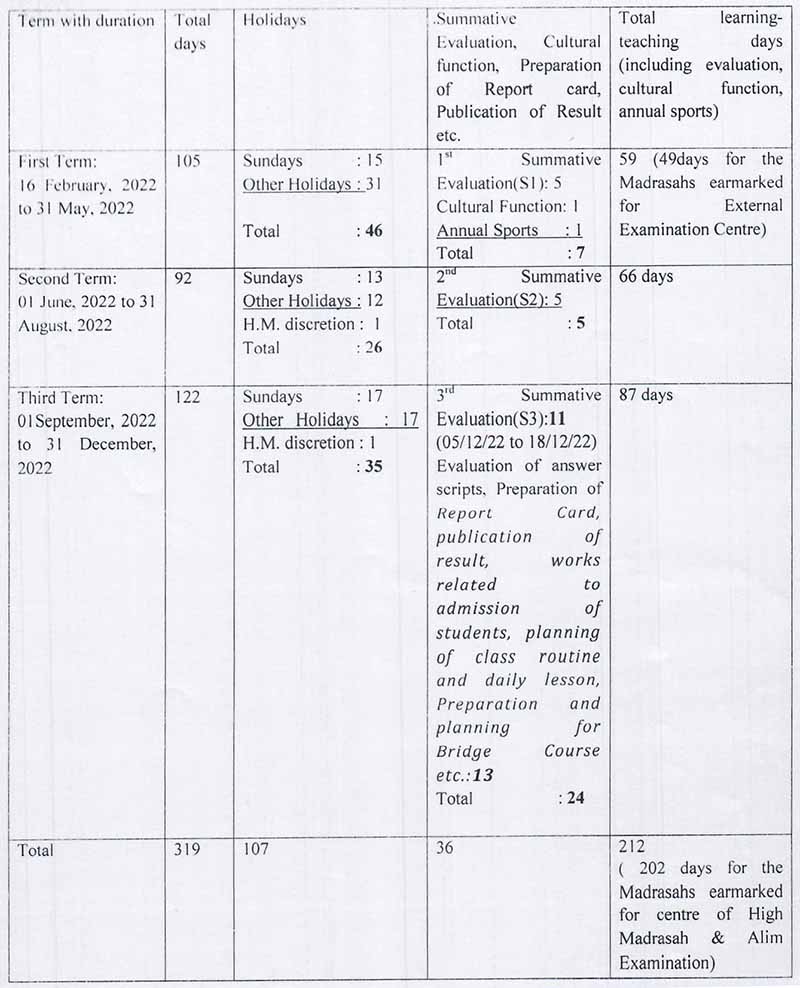
(10) Distribution of Periods:
An academic week (Monday to Saturday) shall consist of 44 periods with 40 to 35 minutes duration each. The distribution of periods per day in a week and weekly class routine for Junior High, High and Senior Madrasah will be as follows:
DISTRIBUTION OF PERIODS (WITH DURATION) FROM MONDAY TO THURSDAY
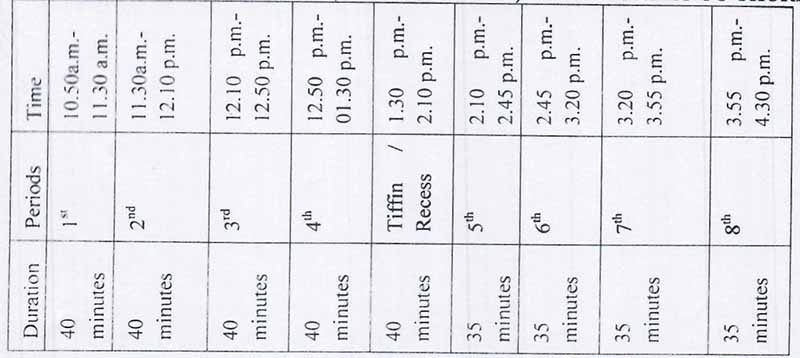
DISTRIBUTION OF PERIODS (WITH DURATION) FOR FRIDAY ONLY
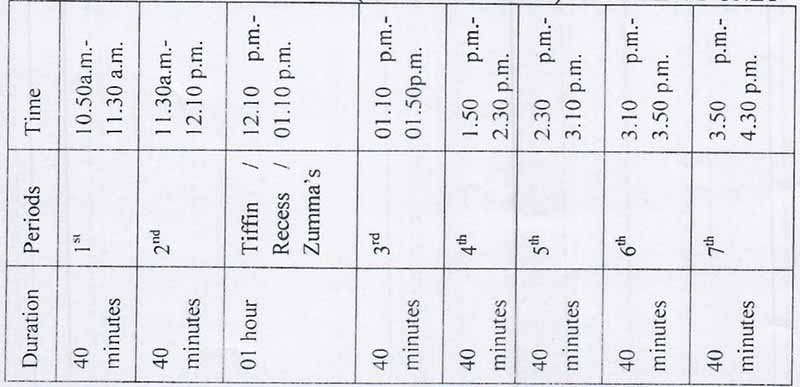
DISTRIBUTION OF PERIODS (WITH DURATION) FOR SATURDAY ONLY

STRUCTURE OF WEEKLY CLASS ROUTINE FOR JUNIOR HIGH AND HIGH MADRASAH
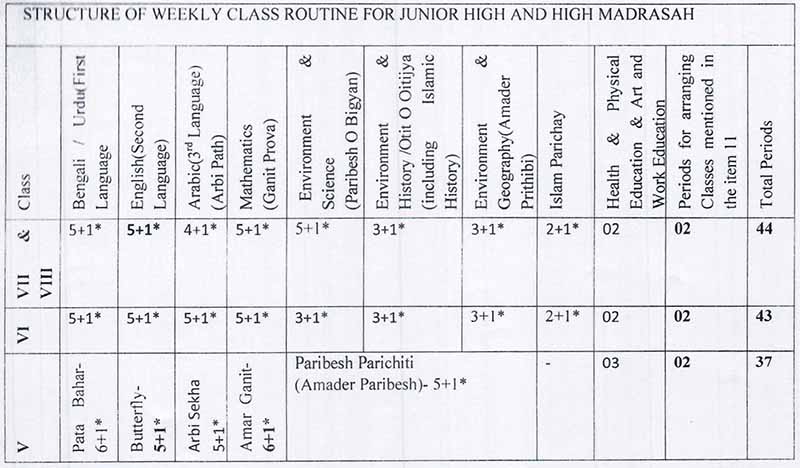
WEEKLY CLASS ROUTINE FOR HIGH MADRASAH
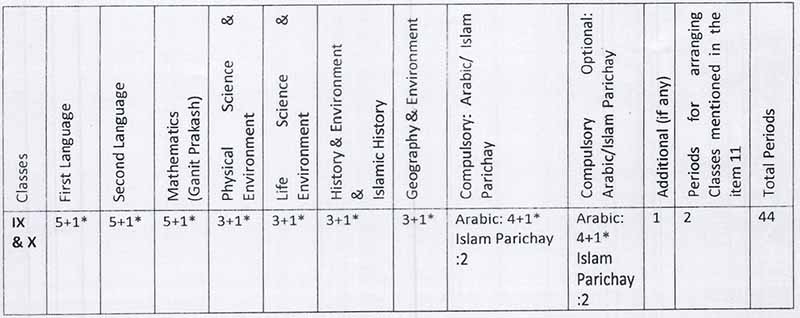
WEEKLY CLASS ROUTINE FOR SENIOR MADRASAH
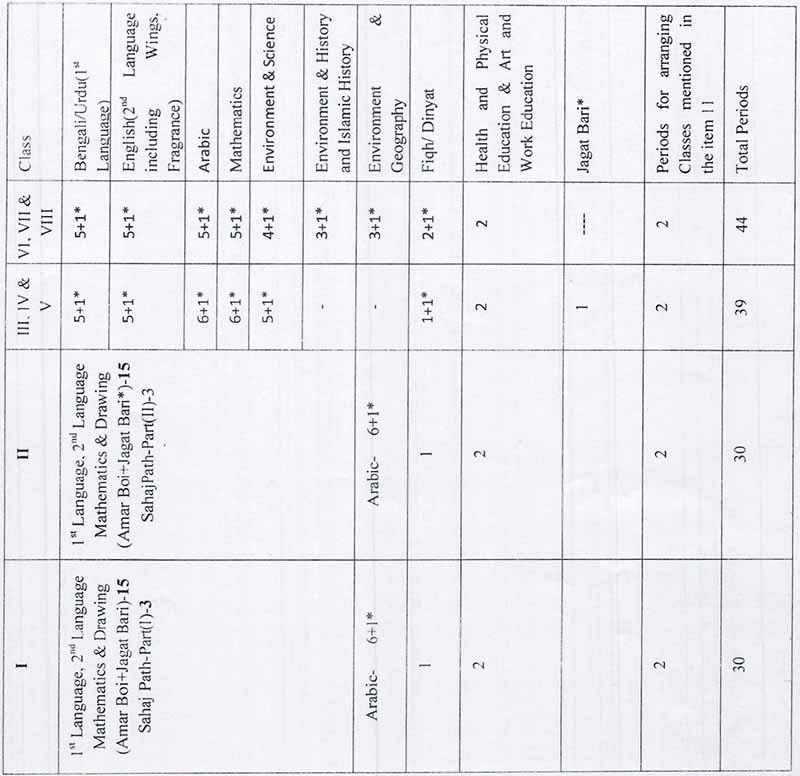
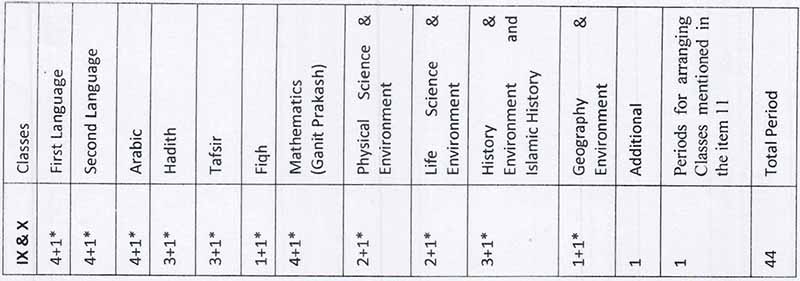
(11) Distribution of Classes:
A. The classes earmarked with asterisk (*) are assigned for assessing learning outcomes as per amendment of RTE ACT, 2009. The child’s development of learning outcomes is to be conducted through formative assessment as well as summative assessment in classes I-VIII and through internal formative evaluation(lFE) in classes IX and X as per the directives of WBBME.
B. The Madrasah authorities are directed to make necessary provisions for arranging library class, smart class/ class through K-Yan/audio-Visual learning. Computer literacy or Laboratory based learning, awareness drives ( Kanyashree, Road safety, Child rights, Disaster management, Snake bites, Child marriage, Child trafficking etc.) regarding curricular subjects as far as practicable.
C. The Madrasah authorities are directed to make necessary provisions for few classes for IX and X as regards the activities given alongside, information and communication technology (ICT), audio-visual learning, reference work, lab-activities/ lab-based learning. Mock tests, Career counseling, Basic legal awareness/ Health awareness/ Skill enhancement workshops, inclusive education, financial literacy etc., as applicable. The library may be used on and often for smooth execution of IFE in classes IX and X as well as for remedial classes.
D. Maintaining teacher’s diary is essential for ensuring formative assessment as well as summative assessment through framing of tasks, learning evidence, class record book, child portfolio on a day-to -day (for classes I-VIII) for each teacher.
E. Every Madrasah is required to furnish a blue print of their routine/ daily time table pertaining to the mandatory structure of time periods/ class distribution as earmarked by WBBME.
F. The Madrasahs will prepare a report and send to WBBME through e-mail (wbbmeaca@gmail.com) just after completion of 3 consecutive summative evaluations with proper evidences, highlighting the extent to which a child’s learning outcome has been achieved through preparation of child profiles. A copy of the same is also to be sent to D.I.S(SE)/A.D.I.S (SE)/A.I.S(SE) of concerned districts and sub divisions, as applicable.
G. In cases of classes I-VIII, the Madrasahs may afford time during effective instructional hour or may use some classes for the following activities (from classes other than subject-based learning) to develop and strengthen their learning abilities within and outside the classroom. The class teacher will incorporate and tag pertinent activities within her/his lesson design to be executed during the instructional hour throughout the academic year. Some of the activities that are exclusively co-curricular in nature (e.g. web designing, awareness drive etc.) may demand allotment of separate classes, independent of lesson design but within the stipulated instructional hours.
(12) Evaluation System:
The Continuous & Comprehensive Evaluation (CCE) system developed by the ‘Expert Committee’ of Government of West Bengal under school Education Department in the year 2013 with partial modification has already been adopted for all types of recognized madrasahs from the academic year 2013. The all round development of the learners will be observed and recorded continuously throughout the year through Formative (diagnostic) and Summative (judge mental) evaluation. The schedule of Summative Evaluation will be as under:

AT A GLANCE
(1) Timings of Madrasah hours
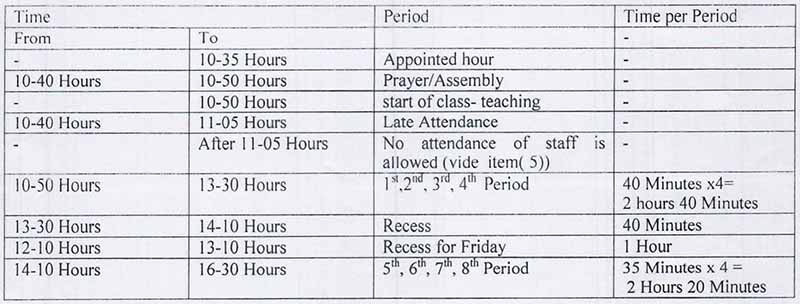
Total Madrasah hours in an academic week = 32.96 hours
Total Learning-Teaching hours (including recess) in an academic week = 31.5 hours
Total Learning-Teaching hours (excluding recess) in an academic week = 27.83 hours
(2) Working days & working hours in the academic year
319 days (Deducting 01 January, 2022 to 15 February, 2022)
Less 45 days (Sundays)
Less 59 days (holidays)
Total Working days: 212 days i.e. 35.33 academic weeks
Total Madrasah hours in this academic year = (35.33 X 32.96) Hrs.= 1164.47 Hours
Total Learning-Teaching days including recess (excluding Summative Evaluations and days after completion of 3rd Summative Evaluation): 176 days
Total Learning-Teaching hours including recess (excluding Summative Evaluations and days after completion of 3rd Summative Evaluation):= (29.33X31.5)Hrs.= 924 Hours
Prayer/ assembly*
The following programme may be followed for daily assembly/ prayer:
a) assembly of students & teachers ( section wise): 1 minute
b) observance of silence: 0.5 minute
c) prayer( including National Anthem): 4 minutes
d) announcement of important daily NEWS by the student/teacher: 1 minute
e) instruction to students by HM/Superintendent/TIC/AHM: 1 minute
f) orderly dispersal in lines to respective classes following the class teacher/monitor: 2.5 minutes
ACTIVITIES:
- Communicative English Classes
- Computer Assisted learning (CAL)( lesson based)
- outdoor class room days/educational tour/ field trip/ community mobilization/ population education
- awareness drives e.g Kanyashree, Road Safety (Safe Drive, Save Life), Bullying, Child Rights, POCSO, Child trafficking, Child Marriage, Vector borne diseases with special reference to Dengue, weekly iron and folic acid supplementation, Vaccination(Rubella,Measles),Administration of deworming tablets, Cyber Crime, Disaster Management, Rain water harvesting. Planting trees. Prevention of pollution, Snake bite, Eradication of Superstitions, wild life conservation. Sanitation, etc.
- Provision for safe drinking water
- music classes (wherever applicable)
- play (drama)/ puppetry workshops( lesson based)
- health, hygiene and nutrition camps for health awareness advocacy programmes
- group activities (an activity bank should be prepared at the Madrasah level)
- summer/ winter camps
- life skill based activities
- counseling
- value inculcation
- adolescent education including Health. Nutrition & personal hygiene
- rock climbing
- global positioning system and weather forecast
- visual arts
- news editing
- content writing
- web designing
- artificial intelligence and machine learning
- preparing museum in Madrasahs based on local resources
- Math Laboratory
- Hands on experiment and basic laboratory exposure
- Kitchen gardening
- Financial literacy
- Recycling of solid waste
- Mock parliament
- Exposure visit to different fairs (e.g. mathematics fair, science fair, health fair), museum entrepreneur centres and Govt. offices.
- Self defence
- Care of geriatric people and awareness about their rights.
- Child guidance clinic for differently able children
- innovative writing workshops; etc. as the need arises, to ensure a child’s social, mental and physical well being and help achieve her/his holistic development and other contemporary interventions, as and when directed by the competent authority.
Sd/- Secretary
West Bengal Board of Madrasah Education